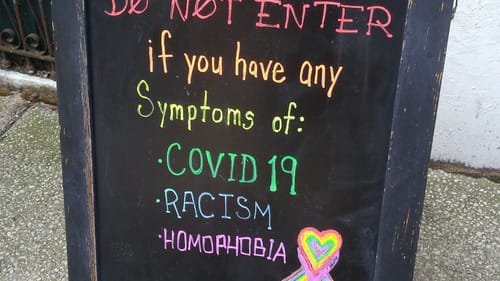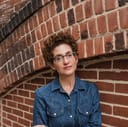Stay in the Loop
BSR publishes on a weekly schedule, with an email newsletter every Wednesday and Thursday morning. There’s no paywall, and subscribing is always free.
The city is my home
When the pandemic hit, what was your beloved community?

Dr. Martin Luther King Jr. helped popularize a vision of a beloved community, and for those who want to achieve the goals of his 1963 “I Have a Dream” speech, this is a step to follow. While philosopher and theologian Josiah Royce coined the term “Beloved Community,” King invested it with more tangible, resonant meaning. (Royce founded the Fellowship of Reconciliation, of which King was a member.) For King, beloved community was not a heavenly dream but an achievable, earthly goal of equality and belonging in which peace and justice prevail. For me, beloved community might look something like this: people of different backgrounds recognizing together that individual well-being is tied to the well-being of others. And we need it now more than ever.
College community
I have been thinking about beloved community since last summer, when it came up in the Summer Session on Contemplative Practices in Higher Education. This professional-development workshop helps people who work in colleges and universities to learn strategies for making better, more welcoming, and more inclusive spaces, using practices from different cultures such as ritual, storytelling, and meditation.
At last year’s Summer Session, LeeRay Costa of Hollins University reintroduced me to beloved community, refracted through the lens of feminist pedagogy. Together, these concepts reinvigorated me: 10 years into my career, I forgot that the transformative power of feminism had drawn me to teaching. Participants in Costa’s workshop worked together to create beloved community in our group, and to brainstorm strategies for fostering similar experiences when we returned to our homes and offices. That fall, I added a paragraph about beloved community on my syllabi and talked with students about forming a classroom community.
Taking turns
Meanwhile, making a new life for myself clarified my need for beloved community. Weeks before the Summer Session, I ended a 16-year relationship and moved into my first real home of my own. As necessary as this was, it left me uncertain about who I am and where I belong. Many people find connection and purpose in faith and family, but I realized I satisfy these needs elsewhere: Community College of Philadelphia and the Christian Street Y are my beloved communities. I am privileged to receive pay for work I find meaningful alongside people with whom I often feel a shared sense of purpose, despite our differences. And I have made friends with all kinds of people in the YMCA’s pool, Zumba classes, and weight room: friends who help each other, celebrate together, and also share a purpose.
When coronavirus hit, my students grieved the loss of a community whose importance they may have underestimated. Seeing how much our classroom community meant to them touched me. Yet technology fostered some beautiful ways to preserve community, from the obligatory Zooms to video messages I sent to individual students who reached out.
At the beginning of a virtual class gathering in April, I asked, “How’s everyone doing?” After students shared their struggles with sudden changes to their learning, parenting during COVID, and stress and uncertainty, someone asked how I was doing. The question struck me as evidence of beloved community, in which everyone takes a turn giving and receiving support. I answered the question honestly. As a person living alone, I struggle with isolation and loneliness. Like my students, I felt the loss of our community. I also deeply felt the loss of my community at the Y.

Grateful in mourning
I felt as adrift as many in the early days of quarantine. Yet the upheaval, listlessness, and uncertainty also felt familiar. I have walked a similar path since last summer. Unlike life in coronatimes, my own path is a path I chose, but that does not make it easier. Just as I found my footing in my new life, COVID-19 disrupted everything for me and for all of us. As I established new routines to replace ones that grounded me in the before times, I felt grateful even as I mourned what I’d lost.
Because of the pandemic, I know how much my beloved communities at CCP and the YMCA mean to me. I missed my students, my colleagues, and our brief, seemingly insignificant conversations before class, in the hallway, on the stairs, on the sidewalk. And I missed my Y friends because they have become true friends. I keep in touch with those I can reach virtually, though I wish I had more phone numbers and email addresses. In the meantime, I found a new community in Monday and Wednesday Zoom Zumba classes.
Lucky to have this home
Equally important, I felt gratitude for having a home I like, that I made for myself, in a city that feels more like home than any other place I have lived in five states and three time zones. I am lucky to have this home, lucky to be able to stay in it, and lucky to have realized Philadelphia is a kind of beloved community for me. I kept thinking of something the great Fran Lebowitz says in Public Speaking (2010), Martin Scorcese’s documentary about her: “The city is my home.”
This is even more true as we weather pandemic as well as political divisions, economic and health disparities, and reckon with the American sins of racism, violence, and inequality. George Floyd’s murder and the civil unrest that followed underscored truths that hopeful rainbows cannot magic away. But mighty waves of anti-racist activism combine with the increasing willingness of Philadelphians to confront the realities of injustice and white supremacy give me renewed hope for Dr. King’s vision. I saw that potential at a picnic in FDR Park in June, looking around at people from all backgrounds celebrating birthdays, playing Wiffle ball, and enjoying summer barbecues together while safely apart. The city is our home. We can make it a beloved community.
Sign up for our newsletter
All of the week's new articles, all in one place. Sign up for the free weekly BSR newsletters, and don't miss a conversation.

 Melissa Strong
Melissa Strong